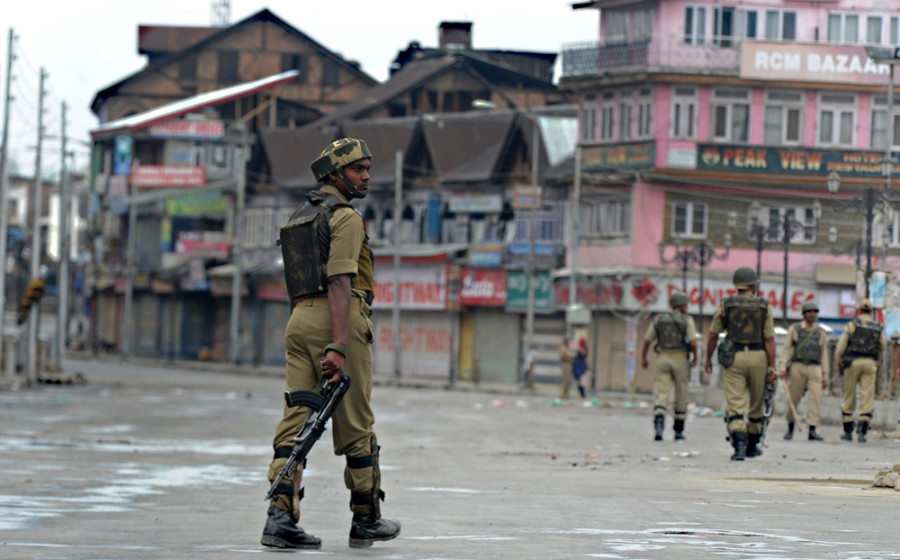National
Without issuing formal statement, foreign minister says Kashmir issue should be resolved through dialogue
Pradeep Gyawali’s comment comes two days before the arrival of the Indian external affairs minister in Kathmandu.
Anil Giri
Two weeks after India’s decision to repeal the special status accorded to Jammu and Kashmir under Article 370 of the Indian constitution, Foreign Minister Pradeep Gyawali on Monday said that the Jammu and Kashmir dispute should be resolved through dialogue.
Although the government has refrained from issuing an official statement on Kashmir, Gyawali, responding to a question during a press conference on Monday at the Foreign Ministry, said, “The Nepal government is in favour of regional peace and stability. The dispute should be resolved through talks and we firmly believe that the government of India has the acumen to resolve the dispute peacefully.”
Gyawali’s statement comes two days ahead of the arrival of Indian External Affairs Minister S Jaishankar, who will be in Kathmandu on Wednesday with a 25-member delegation to the fifth meeting of the Nepal-India Joint Commission.
[Read: Nepal-India Joint Commission will only review past agreements, with nothing new on the agenda]
Views and opinions were divided in Kathmandu on whether the government should take a clear position on the Kashmir affair, as India believes that it is solely an internal matter. While some subscribe to India’s position, others believe that Nepal should issue a statement given its role as chair of the South Asian Association for Regional Cooperation, especially as the issue has the potential to spiral into a regional conflagration.
“We are fully committed to regional peace and stability,” Gyawali reiterated. “Any dispute or unrest in the South Asian region should be resolved through talks.”
Gyawali further said that the government was concerned about the plight of thousands of Nepalis living and working in Jammu Kashmir.
“Our embassy in New Delhi is in touch with the government of India regarding the safety of Nepalis working in that region,” he said. Around 80,000 Nepalis are estimated to be living and working in various parts of Jammu and Kashmir.
Major powers like the United States, China and Russia, along with Bhutan, Bangladesh, the Maldives, Sri Lanka, and Afghanistan have all issued official statements on India’s decision to repeal the special status of Jammu and Kashmir. While South Asian nations have primarily called India’s decision an internal matter, Western countries are more concerned over the deteriorating human rights situation in the region since August 5.
Apart from Kashmir, Gyawali also touched upon the upcoming Joint Commission meeting and the report of the Eminent Persons’ Group on Nepal-India relations.
“We are optimistic about the meeting,” he said. The entire gamut of bilateral issues is expected to be discussed at the meeting, including political relations, security, trade, commerce, and the status of India-funded projects in Nepal.
Gyawali also said that Nepal will make a request to India to officially receive the Eminent Persons’ Group report as soon as possible. The last meeting of the group had decided to submit the report first to Indian Prime Minister Narendra Modi. A team of four members from each country prepared the report on the changing regional and global contexts but New Delhi is said to have reservations over some of its recommendations and thus, has been hesitant to receive it.
***
What do you think?
Dear reader, we’d like to hear from you. We regularly publish letters to the editor on contemporary issues or direct responses to something the Post has recently published. Please send your letters to [email protected] with "Letter to the Editor" in the subject line. Please include your name, location, and a contact address so one of our editors can reach out to you.




 8.22°C Kathmandu
8.22°C Kathmandu














